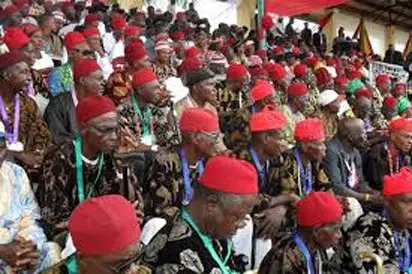Over fifty years after the Nigerian Civil War ended, prominent Igbo voices insist that the same structural injustice and marginalisation that sparked the conflict still define Nigeria’s political landscape.
In an interview with Sunday Vanguard, Dr. Ezechi Chukwu, Publicity Secretary of Ohanaeze Ndigbo Worldwide, and Most Rev. Raphael Opoko, Methodist Archbishop of Umuahia, condemned what they described as the ongoing subjugation of the Igbo in Nigeria. They called for immediate restructuring and equitable inclusion in national governance.
Dr. Chukwu stated that nearly six decades since the war, core issues such as ethnic dominance, political imbalance, and social exclusion remain unresolved.
“We still operate a system structured around ethnic favoritism and religious bias,” he said. “Nigeria functions more on a quota system than on merit or competence. The Igbo are still treated like subordinates, while certain regions enjoy unchecked privilege.”
He criticized the judicial system, access to political power, and distribution of national resources, calling them guided by arbitrary standards. He also highlighted what he called a systemic effort to prevent an Igbo presidency.
“The idea of an Igbo president still faces orchestrated resistance. True restructuring is the only path forward one where regions are empowered to develop based on their own priorities and resources,” he insisted.
Archbishop Opoko echoed similar sentiments, dismissing the Federal Government’s civil war slogan, “No victor, no vanquished,” as hollow. According to him, the Igbo were clearly the war’s casualties and continue to bear the brunt of its aftermath.
“They claimed there were no victors, yet confidential memos warned that the Igbo should never be trusted,” he revealed. “The same forces that derailed the Aburi Accord are behind today’s fuel importation crisis and deliberate governance failures. They empower compliant figures to maintain control.”
He cited the 2025 Unified Tertiary Matriculation Examination (UTME) results, which reportedly saw massive failure among Southeastern candidates, as possibly a calculated move to distract and weaken the region.
“Was it just coincidence? Or a strategic distraction while something significant played out nationally?” Opoko asked. “The truth is, the ruling class thrives on division—political, ethnic, and religious. A united and peaceful Nigeria threatens their control.”
Commenting on the continued detention of IPOB leader Nnamdi Kanu, the Archbishop defended Kanu’s demands as legitimate.
“When Kanu speaks of Biafra, he’s essentially saying: if equal rights and access can’t be guaranteed, then let there be a referendum. That’s not rebellion; that’s a call for justice,” Opoko argued. “Why should an Igbo student with a JAMB score of 230 be denied admission, while another with a score below 100 gains entry and later leads government agencies?”
He warned that the rising generation of Igbo youth is closely observing these patterns of injustice and may one day respond.
“The young are watching, and they may eventually act. History teaches us that constant oppression breeds resistance.”
Archbishop Opoko also accused both domestic and international actors of sustaining the marginalisation of the Southeast.
“In the past, if a cow destroyed your crops, the herdsman apologized. Today, they show up with AK-47s and no one reacts,” he said.
Despite the adversity, he encouraged the Igbo to stay focused on progress.
“Keep excelling in business and industry. Don’t rely solely on political appointments. The oppression is real, but our demand is simple: equal opportunity and fair treatment—nothing more,” he concluded.



